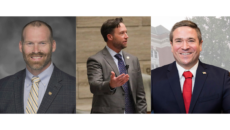Eminent domain has long been a contentious subject, both here in Missouri and nationwide. Eminent domain is the power that governments possess to seize private property and convert it to public use. What usually comes to mind is its use in relation to public utilities, highways, sewer districts, etc. A more current, local, and controversial use of eminent domain was the seizure of property in St. Louis for the construction of the National Geospatial Agency. This power is extraordinary, some might even say coercive, and should only be used when absolutely necessary. Alternatives that avoid condemning private property should always be carefully considered and all other options should be completely exhausted before proceeding with the use of eminent domain. Unfortunately, this is not always the case.
A policy that many consider a government overreach has now been co-opted by the private sector. The use of eminent domain is currently being utilized by a private company to construct an electrical transmission line through rural northern Missouri. Invenergy, which now operates the Grain Belt Express, is able to use eminent domain to further their interests and those of their out-of-state investors. A few months ago, this egregious use of domain began to be used against farmers that are standing up for their rights, and indeed the rights of all Missourians.
Rep. Jim Hansen used the phrase “No Eminent Domain for Private Gain” when he championed the private property rights of Missourians with numerous pieces of sponsored legislation over the years. HB 2033 filed in 2020 was his last attempt to curtail this abuse before he termed out. Unfortunately, HB 2033 was unable to make it through the General Assembly, despite the support of many groups including the Missouri Farm Bureau. COVID-19 cut that session short, but the fight continued with Rep. Mike Haffner picking up the baton. HB 1876, filed this session, would require that county commissions of counties affected by these merchant lines provide resolutions of support to the Public Service Commission (PSC). This must occur before the PSC can issue an approval of the project. The goal of this bill would be to ensure that county governments, and the constituents that they represent, believe that this is a worthy project, and would be a benefit for their county and communities.
Another bill that has been filed regarding the effects of eminent domain, namely the taxes owed because of the forced sale of property, is HB 2515 sponsored by Rep. Chad Perkins. HB 2515 takes the approach that property seized through eminent domain should not be subjected to the same taxes as property that was sold voluntarily. This is an important ancillary bill that can provide much-deserved relief to those impacted, not just by the Grain Belt Express, but by any eminent domain use in the state of Missouri.
HB 1876 and 2515 are important bills that deal with an issue that should greatly concern every Missourian who values the protection of private property. This is not just an urban or a rural issue; it’s an issue that affects all Missourians, and we all deserve to have one of our most fundamental rights protected.

Scott Bell is a legislative assistant in the Missouri House of Representatives. He was previously an elections specialist at the Missouri Secretary of State’s Office. He is a native of Franklin County who studied political science at the University of Missouri – St. Louis and resides in Columbia.













